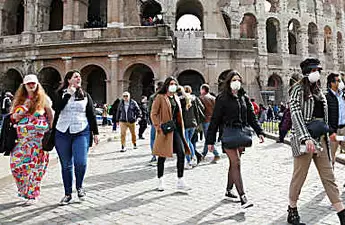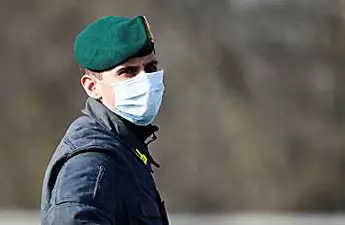Issued on: Modified:

The spreading coronavirus epidemic shut down France's Louvre Museum on Sunday, with workers who guard its trove of artworks fearful of being contaminated by the museum's flow of visitors from around the world. This is just one of many measures put in place to try and contain the disease, as the number of coronavirus cases in France reached 130 since the end of January, including two dead and nine in a serious condition.
ADVERTISING
“We are very worried because we have visitors from everywhere,” said Andre Sacristin, a Louvre employee and union representative for its staffers.
“The risk is very, very, very great," he said in a phone interview. While there are no known virus infections among the museum's 2,300 workers, “it’s only a question of time,” he said.
Also worrying staffers is that museum workers from northern Italy are now visiting the Louvre. They have come to collect works by Leonardo da Vinci that were loaned for a major exhibition, according to Sacristin.
A short statement from the Louvre said a staff meeting about virus prevention efforts stopped the museum from opening as scheduled Sunday morning. On Sunday afternoon, would-be visitors were still waiting to get inside.
A meeting with the museum management is scheduled for Monday. Sacristin, who will be taking part, said museum visitors should be subjected to health checks and that “if there are cases, then the museum should be closed."
France’s most famous museum is one of many places in the country affected by the government’s measures to try and curb the coronavirus’ spread. On Saturday, France banned all indoor public gatherings of more than 5,000 people.
"All gatherings of more than 5,000 people in confined spaces will be cancelled," said Health Minister Olivier Véran.
France’s most famous museum is one of many places in the country affected by the government’s measures to try and curb the coronavirus’ spread. On Saturday, France banned all indoor public gatherings of more than 5,000 people.
"All gatherings of more than 5,000 people in confined spaces will be cancelled," said Health Minister Olivier Véran.
The same goes for events "in an open environment where people can mix with others from areas where the virus is possibly circulating".
Having previously recommended that people avoid shaking hands, the minister said they should also cut back on “la bise,” the custom in France and elsewhere in Europe of giving greetings with kisses, or air kisses, on the cheeks.
These measures were decided on Saturday during an exceptional meeting of the Defence Council, chaired by President Emmanuel Macron. They are part of the transition to stage 2 of the epidemic, on a scale of 3.
The ban "potentially affects hundreds of concert halls in France with more than 5,000 seats, and therefore thousands of cultural events", the French cultural workers’ union Prodiss warned in a press release.
These measures were decided on Saturday during an exceptional meeting of the Defence Council, chaired by President Emmanuel Macron. They are part of the transition to stage 2 of the epidemic, on a scale of 3.
The ban "potentially affects hundreds of concert halls in France with more than 5,000 seats, and therefore thousands of cultural events", the French cultural workers’ union Prodiss warned in a press release.
At the same time, Paris’ celebrated Agricultural Show, one of the biggest commercial events in France, ended on Saturday evening 24 hours ahead of schedule, after attendance had already been substantially lower. It attracted some 630,000 visitors in 2019, but this year there were just 480,221 despite it lasting one day less.
“The coronavirus has strongly contributed” to this figure, the president of the Agricultural show Jean-Luc Poulain told us at France24.

![A Fashion Model Convinced A Hotel Owner To Change All Of Their Pillowcases [Story] A Fashion Model Convinced A Hotel Owner To Change All Of Their Pillowcases [Story]](https://images.outbrainimg.com/transform/v3/eyJpdSI6IjBiMDRjZmQ2MTljN2ExMWZjNGU4OWUyNzBhMTRmYmMzYTI5YjFhNmJlNWRjZjg5NzUxNWY1ODE2MDdmNmI1ZWMiLCJ3IjoyMzAsImgiOjE1MCwiZCI6MS41LCJjcyI6MCwiZiI6NH0.webp)




![[Gallery] Deeply Depressed Baby Elephant Finds Comfort In A New Friend [Gallery] Deeply Depressed Baby Elephant Finds Comfort In A New Friend](https://images.outbrainimg.com/transform/v3/eyJpdSI6IjU3ZjU5YTJlNTQwMGNlNDk5MzJjZjUyNDIyOWIxN2FmMDNlMzhiNDZiMGQ4MDRjMTA1YTIyMmRhZjc1ZTE2MjIiLCJ3IjoyMzAsImgiOjE1MCwiZCI6MS41LCJjcyI6MCwiZiI6NH0.webp)





No comments:
Post a Comment